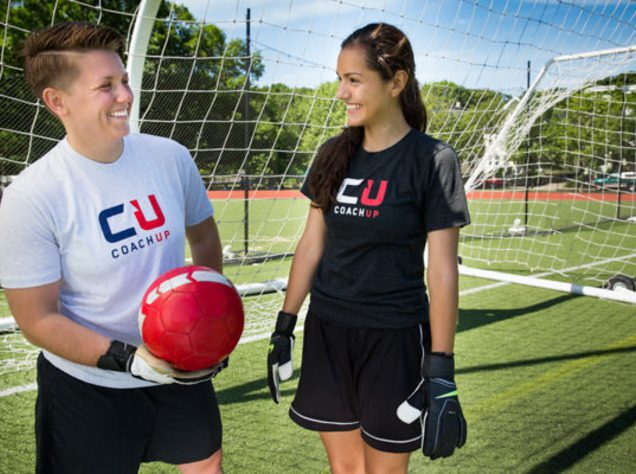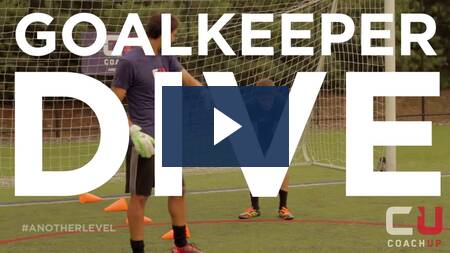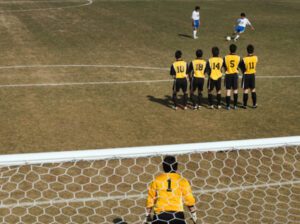I had the privilege of coaching a small camp for CoachUp and had an experience that reminded me why my life must include some element of coaching in it. I was in charge of the station on defense, so I designed a 20 minute curriculum that included footwork drills to learn defensive posture, tackling technique, and then 1v1s to give the kids a chance to try out the technique in a game-like setting. I made the kids laugh by telling them that I was a goalkeeper, therefore it was super important to me that my defenders knew what they were doing so I could just stand back there and look pretty the whole game. They got a kick out of that as I pretended to throw my non-existent long hair back and strike a diva pose.

Jokes aside, the bond between a goalkeeper and her back line isn’t something you can teach – it’s the kind of thing that develops over time and is one of the most beautiful parts of the game. My defenders covered me countless times: taking hits for me when an incoming forward wouldn’t stop her run, saving a ball off the line when I came out for a breakaway and poorly timed my approach, and of course, tying my shoes – because seriously, tying your shoes with gloves on during a game is almost impossible.
In exchange, I was their eyes and brain at times. I could watch a play developing down field and pull my line into position based on where I anticipated the other team to counter-attack. I could scream “left shoulder” to a center back who was watching the play on her right, encouraging her to peek over that shoulder at the player about to make a run across her zone. I was also the first person my defenders saw when a ball would go in – and I was the first to meet their eyes with positive reinforcement.
Those moments are crucial. You have about 30 seconds to mourn and analyze a scored goal before you need to pull yourself together again and go hard at the kickoff. Defenders and goalkeepers accomplish a lot for each other emotionally in that half-minute and it’s something that goes unseen to the untrained spectator.
Taking The Next Step
I muse about these beautiful relationships because it’s the kind of thing I want kids to get out of playing sports. Since becoming a private coach, I’ve had a lot of people tell me “my kid isn’t good enough to play in college,” or: “I don’t want to overwhelm him with illusions of playing at the next level.” I hear that and can respect it. I did play at that next level and had everyone from the local newspaper to former professional players telling me that’s where I was headed. I do know exactly what it takes to get to that level. The journey was a lot of fun, but there were also a lot of sacrifices my family and I made to make that dream possible. I don’t regret a single moment of it. However, when I look back on my career I don’t remember the wins and the awards and the elite experiences. I remember the parts of the game that I had access to because the basics were habits I could perform in my sleep.
I remember the relationships and the moments of desire and fortitude that come from knowing you are skilled enough to experience the challenge and beauty of competition. I remember how much I loved the game.
There’s a lot of negative press out there about the downsides of youth sports, and a bunch of it is worth your attention. As a sociologist and educator, I’m in tune to a lot of these arguments. Kids should be kids. Kids should be whole. Kids should play for fun, not become overwhelmed with the pressure of being the best. I agree with all of that. But private coaching isn’t the demon here.
In fact, I see myself as just another tool for accomplishing those goals for children. I am capable of working with athletes that want to play at the elite level and will gladly take on clients that have those goals. However, I’m likely to be at odds with the parent who has lost sight of their kid’s development as a whole person. Those kids will find a mentor and role model in me for what it means to pursue an elite level dream while maintaining a balanced life. My career was ended because of injury, so my perspective on life beyond the game is probably the greatest skill I could teach a young, elite athlete.
But let’s talk about the kids who will never play in college or go pro. What do they have to gain from private coaching?
What’s Next?
Flashback to the field, where I was coaching that coed camp with a diverse group of players. I had a player who was struggling developmentally to make the connection between his feet and my verbal and visual cues for an agility drill. He couldn’t make sense of anything I said or showed him and I could sense his mounting frustration and the potential snickers of his peers who had no trouble accomplishing the drill.
I have a nephew just like him and it’s broken my heart to see him give up on team sports because no one took the time to figure out how he learns. My nephew is the kindest, sweetest boy you will ever meet and his intuition for the world around him is a gift to all he meets. I also know that he’s had to develop this intuition to somewhat make up for his inability to run and play like the other boys. He’s an independent, quiet soul and can make just about anything out of legos or on Minecraft.
His spatial and tactile awareness is amazing alone or one-on-one, and so it has always confused me why no coach has figured out how to transfer this awareness into the kind of kinesthetic awareness that would make team sports possible for him. In a last ditch effort to help the boy at camp who reminded me of him, I decided to experiment with a tactile approach to physically guide him through the agility drill, where he could focus on my movement and not whatever mixed signals he was getting in his brain. The look of joy on his face when he finished the drill successfully was bright enough to power a stadium.
His dad approached me after, astonished, to tell me that it was a breakthrough moment for his son and I relayed to him my philosophy of private coaching – which I think you should all hear. Private coaching is a chance to invest in a child’s wonder and enjoyment. The game is simply more fun when you know what you are doing and feel confident. A private coach can spend time with a kid and invest in their learning and development in a way that usually isn’t possible from a team coach. My goal that night was to make sure that boy walked away confident that he belonged on the field with his peers.
(Related: Read about the benefits of private training here.)
Huddle Up
It’s personal to me. The game has taught me so much about myself and the world around me and I want every kid to have a chance to learn from it, too. It has been my greatest teacher. I want that for every kid. My job is to facilitate that learning. My job is to be the person that spends my time and skill on a child so that he or she can maybe level up and unlock all those things I remember about the game. I want every goalkeeper to experience the bond with his back line that I recalled earlier.
I want every forward to appreciate the beauty of untying a defense with her footwork and tenacity. I want every midfielder to experience the symphony that happens when he suddenly sees the game in slow motion and knows he has the power to orchestrate play. I want every defender to feel the urgency and responsibility of a team holding its breath while she makes a perfectly timed tackle. These are the secrets of the beautiful game.
I am a coach because I want every kid to have a chance to learn these secrets. So if you’re thinking about booking a private trainer, go for it! You have nothing to lose and everything to gain. What are you waiting for?
Be prepared for the biggest moments by mastering the small ones off the field.
How useful was this post?
Click on a star to rate it!
Average rating 5 / 5. Vote count: 1
No votes so far! Be the first to rate this post.




